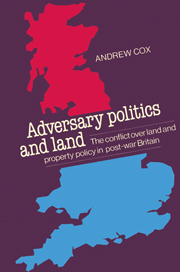Book contents
- Frontmatter
- Contents
- Preface
- PART A INTRODUCTION
- PART B THE PROBLEM OF LAND AND PROPERTY IN BRITAIN AND THE EFFECTIVE LIMITS ON GOVERNMENT POLICY INITIATION
- PART C THE HISTORY OF ADVERSARIAL POLICY FAILURE IN LAND AND PROPERTY IN POST-WAR BRITAIN
- 4 Labour, the 1947 system and the collapse of the development market (1945—1951)
- 5 The Conservative free market approach and the 1950s property boom (1951—1964)
- 6 Labour, the Land Commission and the problems of implementation (1964–1970)
- 7 The second failure of the Conservative free market approach and the 1970s property boom (1970–1974)
- 8 Labour and the failure of the Community Land Act (1974–1979)
- PART D CONCLUSION
- Notes
- Index
8 - Labour and the failure of the Community Land Act (1974–1979)
Published online by Cambridge University Press: 29 September 2009
- Frontmatter
- Contents
- Preface
- PART A INTRODUCTION
- PART B THE PROBLEM OF LAND AND PROPERTY IN BRITAIN AND THE EFFECTIVE LIMITS ON GOVERNMENT POLICY INITIATION
- PART C THE HISTORY OF ADVERSARIAL POLICY FAILURE IN LAND AND PROPERTY IN POST-WAR BRITAIN
- 4 Labour, the 1947 system and the collapse of the development market (1945—1951)
- 5 The Conservative free market approach and the 1950s property boom (1951—1964)
- 6 Labour, the Land Commission and the problems of implementation (1964–1970)
- 7 The second failure of the Conservative free market approach and the 1970s property boom (1970–1974)
- 8 Labour and the failure of the Community Land Act (1974–1979)
- PART D CONCLUSION
- Notes
- Index
Summary
The dilemma facing Labour in 1974 and the unfreezing of business rents. The Community Land Scheme: Labour policy radicalism versus the power of constraint.
Since 1945 governments have been free to initiate policy as they wished, even though the unforeseen and unintended consequences of their policies often forced them later to adopt ‘fiscal-regulating’ or ‘fiscal-interventionist’ solutions to end property speculation and to protect local government planning. By the 1970s, however, this freedom to indulge in adversary politics when entering office eroded. The ability of Conservative or Labour governments to pursue laissez-fairism or state control was circumscribed by socio-economic constraints.
There were a number of reasons for this. First, there was the serious overall deterioration of Britain's economy associated with declining international competitiveness, a falling share of world trade, rising unemployment, and inflation and a growing public sector borrowing requirement. But, added to this, government land policies faced the peculiar constraints operating in the property market in the 1970s. The Heath government's policy for the financial sector created a property boom, and a subsequent freeze on business rents undermined confidence in property companies, secondary banks and, ultimately, the established financial institutions in the City. The consequential need to bolster the international role of the City was to limit the room for manoeuvre of both the Heath government and the Labour government which replaced it in February 1974. This fact is illustrated by the policy gyrations of the Heath government throughout 1973. The freeze on rents introduced in January was partially repealed in October because it threatened to undermine the role of the City.
- Type
- Chapter
- Information
- Adversary Politics and LandThe Conflict Over Land and Property Policy in Post-War Britain, pp. 176 - 192Publisher: Cambridge University PressPrint publication year: 1984



